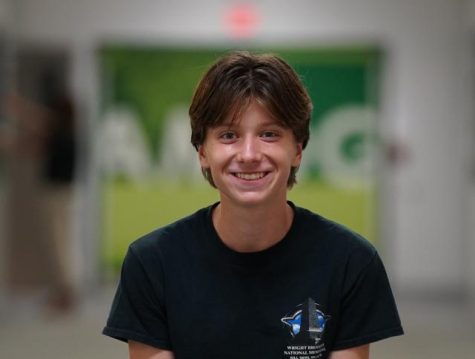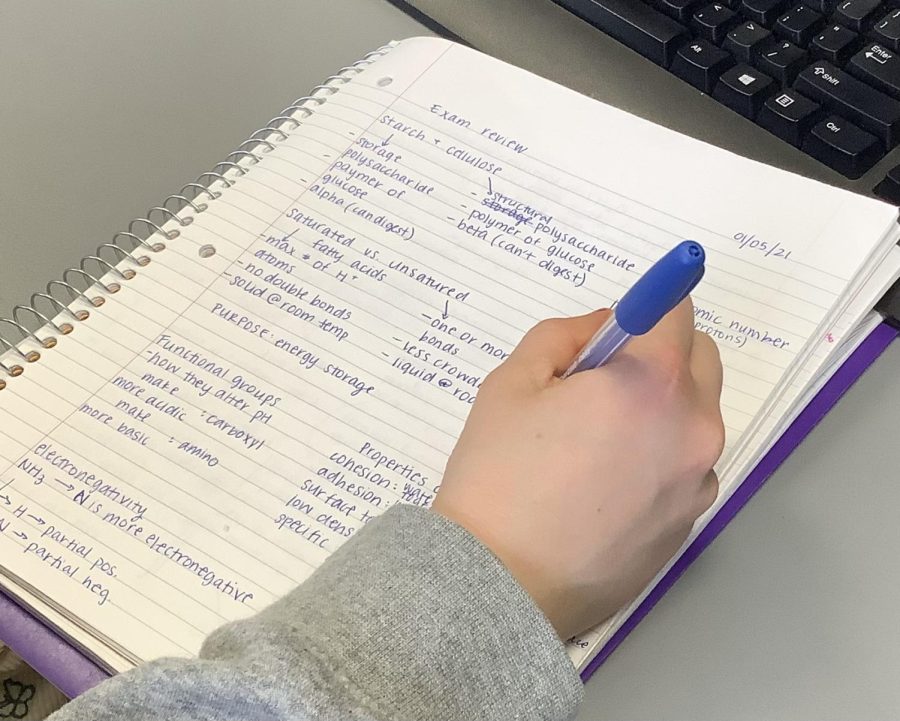Should We Rethink Final Exams?
A student takes notes to prepare for a final exam in the winter of 2022.
Now that all Jesuit students have finished winter exams, it’s time to take a serious look at the role of finals in students’ learning.
After discussions with several teachers, it’s clear that there are mixed feelings about whether finals actually promote learning or could, in fact, be replaced with a project or another form of assessment. There was also discussion about whether finals have a role in the purpose of a Jesuit education.
“I know that for myself, doing graduate school and having to prepare for my master’s degree exam, the finals solidified the concepts in my mind in a very real and deep way because I spent lots of time studying and preparing,” said Greg Allen, head of the theology department.
Allen said that for particular courses, finals may be more important to learning than other courses.
“I think it depends on the subject,” Allen said. “[With] math, you have to be able to show that you can do the work. So you have to study and you have to take a test. You can’t just do a project. However, I think we do have to be a bit more flexible. I like having the option from a teacher’s standpoint or a department standpoint to make a decision of what would be best in the situation.”
Departments such as the English, have begun to move away from a traditional finals model and more towards a metacritical exam. Maureen Milton, an English teacher at Jesuit High School tells about the metacritical process.
“A metacritical exam is asking the student to go back and examine their processes and their practices over the semester,” said Milton. “Look at what kind of writer you have been, what’s your process been like, what are strengths and weaknesses, what are your goals going forward? What kind of reader have you been? What kind of a writer have you been? Classroom citizenship? What are your goals going forward? What kind of a student have you been? Planning? Time management? Punctuality?”
The metacritical exam moved into the English final model after a department-wide agreement on how to better assess and instill knowledge of reading and writing into students.
“For years, we gave finals where kids had to write an essay on demand after spending an entire semester being told to revise their work,” said Milton. “So, it seemed antithetical to what we were arguing all semester that 20 percent of your grade was based on a one and done essay. “Personally, as a teacher it has been really nice to have my students go back and look at the comments of what they have written and then examine their own practice.”
A metacritical exam is used to help students reflect on the way they worked throughout the semester, but how does a metacritical exam solidify concepts such as math and science in students’ minds?
“I think you could do interdepartmental projects,” said Milton. “Say you did a bio project and you incorporated stats and you looked at biological phenomenon, maybe an invasive species, and you looked at its displacement of a native species and that was your senior project. You would still have to write, you would still have to read, you would still have to do research, you would still be doing math, and you would still be doing science and all those things would still be integrated.”
This idea is a strong example of project-based learning, a teaching method in which students learn by actively engaging in real-world and personally meaningful projects which is argued to aid in deeper learning.
“Personally, I believe in project-based and competency based learning and assessments,” said Russell Fiorella, a new member of the Jesuit Theology department. “I think that’s the future of Jesuit education and by extension J High. If you were to read expert voices in the field of education at UPenn, Harvard, Stanford, Boston College, and so forth, they are all basically saying that the next few years in the wake of the pandemic are critical moments, to really reflect on what things must stay, what things no longer work, and what changes need to be made to ready kids for this century, the 21st century.”
“What if we shared and celebrated what we learned over a semester?” asked Fiorella. “Answering that question of engaging in a new way of summatively assessing ourselves takes time, creativity, and courage. But it can also be really, really fun and lead to deeper engagement with who we are called to be: Women and men for and with others! Bearers of Hope!”
Although perspectives may vary on how finals should be conducted, the pandemic elicited a huge change in people’s perception of not only finals, but how to approach education and learning.
“I think Covid has done a lot of damage in a variety of ways,” said Allen. “One of those ways is our ability to buckle down and do hard work. Everything is hard amidst Covid. But once we move out of it, how do we make sure that we have that strength and resilience, particularly in our brain.”
Although the pandemic may have temporarily hindered people’s ability to “do hard work,” as life returns to normal, it will certainly be a new normal. This new normal will come from the pandemic forcing people to reflect and adapt from old routines, described Milton
“Covid, for all of its tragedy, obviously provided us with an opportunity to think about what education could be in the 21st century,” says Milton. “In this larger picture, finals are a vestige of the way education used to be and that’s worth examining. Covid was sort of this wake up call. One of the silver-linings of it is that we can examine ‘what is the role of education in general’, and then the subset of that is ‘what is the role of finals.’”
The pandemic also gave people a situation to relate with one another. With institutions shut down, the opportunity for reflection and push toward change was inevitable, as explained by Fiorella.
“Change can be really scary,” said Fiorella. “But what gives me tremendous hope is how many teachers I’ve encountered in my first six months at Jesuit that are thinking about and already implementing alternative ways of learning and assessment, specifically ways that move toward a more student-centered approach. What gives me even more hope is that I’ve witnessed not only teachers but students, administrators, and staff members, who are really dedicated to trying to do that worthy mission-driven work everyday. That’s super exciting and encouraging.”
Added Fiorella: “I’ve been at a few other Jesuit schools before arriving at Jesuit this past August. While all Jesuit schools have their unique characteristics, each has the same mission. Every time I wander over to Arrupe hall, typically to talk shop about the Buffalo Bills or Buffalo Sabres with Mr. Falkner, I always see the image of Fr. Pedro Arrupe and his words ‘We shall all become bearers of hope.’ Those words seem like a great starting point. What’s our purpose at Jesuit High School? To become bearers of hope.”
“Let’s break ‘becoming bearers of hope’ down further,” Fiorella continued. “Part of our purpose is to invite students to look within themselves and ask, “Who am I?” The other side of that is: Whose am I? Or, in other words, ‘what is my connection to the greater world outside of Jesuit High School?’ If we think back to the exam experience we took a few weeks ago, does that experience of taking exams bring us closer to our mission to become bearers of hope?”
“Listening to the voices of solid educators and, most importantly, asking students how they really want to learn and be assessed, is critical in our discernment on this.”

storytelling is at the forefront of his life, through seeking out new adventures and finding creative ways to describe the world around him. As a young kid, Gus was surrounded with art and
writing and never saw himself doing much of anything else. Through listening to his dad make up crazy stories about made up characters, to walking around OHSU and sitting through
interviews of dental students with his mom, storytelling was always there. This will be Gus’s second year as an editor and writer for the Jesuit Chronicle. In his first year as a Journalism
Student, he learned the fundamentals of Indesign as well as explored topics ranging from the Jesuit administrative policies to food writing. Gus enjoys writing opinions , sharing different
perspectives, and connecting people through stories. He hopes to continue discovering what he loves to write about as well as continue to put passion into his work to connect the Jesuit
community through stories and discussion. In his free time, Gus enjoys running, cooking, drawing, going on long walks, and being with family.



